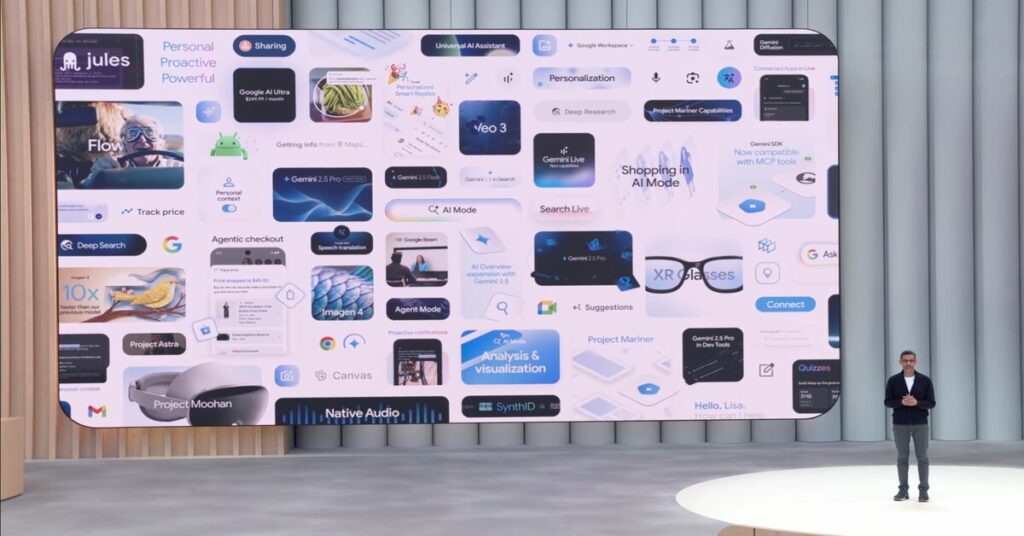
Google I/O 2025
Table of Contents
Introduction to Google I/O 2025
Google I/O 2025 wasn’t just a product showcase—it was a clear vision for the next decade of intelligent, context-aware computing. From the vastly improved Gemini AI to breakthroughs in real-time language translation, virtual reality, and interactive agents, this year’s event revealed a Google that’s more focused than ever on building a helpful, human-centered digital future.
Gemini 2.5: The Brain Behind the Curtain
The star of the show was undoubtedly Gemini 2.5, the most advanced version of Google’s foundational AI model yet. Running on Google’s custom-built TPU 7 Generation Ironwood chips, Gemini 2.5 is faster, smarter, and more memory-efficient than any of its predecessors. What sets this iteration apart isn’t just its technical ability—but how seamlessly it integrates across Google’s ecosystem.
In “agent mode,” Gemini behaves like a personal assistant that not only understands natural language but also takes meaningful actions. It can book reservations, summarize long documents, analyze your calendar, and even interact across apps like Gmail, Docs, and Maps—all in real time.
Gemini Live: Conversational AI with Eyes and Ears
Perhaps the most futuristic demo came from Gemini Live, which introduces voice-based, multi-modal interaction. You’re no longer limited to text commands or simple prompts. With the live camera integration, users can point their phone at real-world objects, and Gemini will provide context instantly—whether it’s identifying a plant, analyzing a chart on a whiteboard, or translating a menu in a foreign language.
It even supports interruption and correction, allowing back-and-forth conversations that feel more like talking to a human than interacting with a machine.
Flash and Text-to-Speech Magic
A more lightweight sibling of Gemini 2.5, Gemini 2.5 Flash, also debuted—designed for speed and efficiency on mobile and lower-power devices. It’s ideal for quick tasks: summarizing texts, generating smart replies, and responding to queries without lag.
One of the more exciting updates for Android users was the revamped text-to-speech engine, powered by Gemini. Voice output now sounds far more natural, with fluid intonation and contextual nuance that elevates everything from accessibility tools to voice search.
Google Search Gets Smarter with AI Overviews
If you thought Google Search had peaked, think again. With the rollout of AI Overviews, Google is turning traditional search on its head. Now, instead of ten blue links and ad clutter, users get structured summaries with citations, visuals, and follow-up questions.
For example, you can ask, “What’s the best electric car for long road trips under $50,000?” and get a neatly organized response including comparisons, reviews, specs, and maps—all without having to click around endlessly. It’s search that behaves like a smart conversation.
Project Astra: A Glimpse of the Future Assistant
In a demonstration that drew gasps from the audience, Google introduced Project Astra, a prototype assistant designed to see, hear, and remember. Astra can identify objects in real time, answer follow-up questions about them, and even recall where you last left your keys.
It doesn’t just understand input; it understands context. This could very well be the blueprint for the AI assistants of the future—capable of tracking your surroundings, your interactions, and your needs in one cohesive experience.
Project Starline: Holographic Presence Becomes Real
Project Starline returned with a sleek new look and significant progress toward making holographic video calls feel natural. Using depth sensors, AI rendering, and spatial audio, Starline creates a life-size 3D model of the person you’re talking to—making virtual meetings feel face-to-face again.
It’s a major leap toward more immersive communication, and with today’s distributed work culture, the timing couldn’t be better.
Project Mariner and Google Beam: Smarter Knowledge Sharing
While much of the spotlight was on visual and audio advancements, Google also introduced Project Mariner, a behind-the-scenes effort to index and understand large volumes of enterprise data in real time. Think of it as AI-powered knowledge management, helping businesses unlock insights buried deep within documents and datasets.
Then there’s Google Beam, a feature that lets you instantly transfer Gemini conversations between devices. Start chatting with Gemini on your phone, tap your laptop, and the entire thread—with context—seamlessly continues there. It’s not just multi-device access—it’s contextual continuity. The new Google Beam will be released soon in partnership with HP with a 6-ray camera that will transform 2D Videos to 3D Realistic Experience.
Smart Replies, Now Truly Personal
For those tired of canned, robotic auto-responses, Google’s updates to personalized smart replies are a game-changer. Instead of generic “Sounds good!” or “Thanks!”, Gemini now crafts responses in your own tone and writing style, drawing on past emails and messages (with your permission, of course). Over time, it feels like it’s writing as you, not for you.
Real-Time Speech Translation in Google Meet
Breaking language barriers was a key theme this year. In Google Meet, real-time speech translation is now rolling out to more languages, with translations happening on-screen as people talk. Whether you’re in a global business meeting or a cross-cultural classroom, everyone can understand and be understood.
Android XR: Mixed Reality is Here
Lastly, Google officially entered the mixed reality space with Android XR, a new platform built in collaboration with Samsung and Qualcomm. While the actual headset wasn’t the centerpiece, the infrastructure is ready—promising immersive experiences for entertainment, education, and productivity, all deeply integrated with Android apps and Gemini intelligence.
Final Thoughts
Google I/O 2025 wasn’t just about new features—it was about a unified ecosystem powered by a smarter core. Gemini 2.5 and its supporting technologies signal a future where AI doesn’t feel artificial—it feels natural, responsive, and genuinely helpful.
From personalized replies to spatial computing, from real-time assistants to holographic video calls, Google isn’t just chasing innovation—it’s shaping how intelligence becomes a part of our everyday lives.
You Can Also Read: Why the Acer Aspire 14 AI Could Be 2025’s Best Laptop for Students and Professionals
